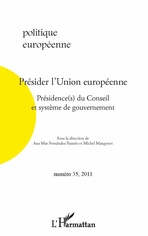The Institutionalization of the European Council Presidency : Institutional Dependence and Franco-German Inflections

Following its pragmatic emergence in the EU political landscape, the Presidency of the European Council was the most visible part of the rotating Presidency until the entry into force of the Lisbon Treaty. An in-depth analysis of this function shows its long dependency on the half-year exercise.
The Institutionalization of the Presidency of the European Council was primarily marked by two periods of inflection during which the behaviours of the actors, especially French and German leaders, have tailored a presidential role dissociated from the rotating presidency. The emergence of this supranational role has led to heightened tensions over questions of identity, due to its exercise by national leaders. Moreover, the secondary nature of its legal formalization as regards reflections and codifications by the actors themselves is clearly underlined by this institutional construction.
Related centers and programs
Discover our other research centers and programsFind out more
Discover all our analysesThe Franco-German Brigade and the Revival of European Defense
One thing has been clear since Donald Trump's return to the White House: the very existence of the European unification project is threatened. Unless it develops a sovereign defense policy to counter the war in Ukraine and the weakening of American security guarantees, the European Union will continue to see its internal cohesion and external attractiveness wane.
Friedrich Merz and the Zeitenwende 2.0. A “New Era” for Transatlantic Relations?
On February 23, 2025, almost 60 million voters were called upon to elect a new Bundestag. These elections will also give rise to a new government in Europe's largest economy.
After the Elections: Germany in Search of Shaken Stability?
With a voter turnout of 82.5%, Germany recorded its highest participation since 1987—an increase of 6.1 percentage points compared to 2021. As in the previous election, the high turnout particularly benefited the Alternative for Germany (AfD), which was able to mobilize many former non-voters. Many voters sought to punish the outgoing government with their ballots, as its approval rating had dropped to just 14% before the coalition broke apart in November 2024. Germany is now very likely heading toward a grand coalition between the CDU/CSU and the SPD, with exploratory talks having begun on February 28.
The German Greens as an Alliance Party: The End of an Illusion?
At the Wiesbaden Congress in November 2024, Robert Habeck, currently Minister for the Economy and Climate, was nominated as the Green Party’s candidate for the Chancellorship in the early parliamentary elections on February 23, 2025. The party, founded 45 years ago, is now firmly established in the German political landscape. Wishing to turn the page on an unloved ‘‘traffic light’’ coalition, the party is banking on a personal campaign and an optimistic discourse based on the energy transition and social justice.









